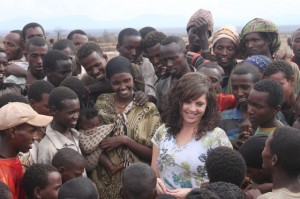Over 80 different tribes inhabit Ethiopia, many with their own languages or dialects. But, there are only three or four major spoken dialects. Most of the country, like the area of Kersa Illala, is in the Oromia region where Oromo is spoken. In the larger cities, Amharic is spoken. The two languages are not similar, with only a few crossover words to link them together. Words may not be as hard to speak in Oromo, but when traveling through the country foreigners have to learn where to expect one language and where to expect the other. Of the MAI American staff, Evan Maxfield is one of the best at understanding the native languages. He has learned it well enough to order food and have basic conversations. The major religions practiced in Ethiopia are Islam and Orthodox Christianity. A very small percent of the population still practice their traditional faiths. The Church of Jesus Christ of Latter-Day Saints (LDS) has four branches in the country, as well. While harvesting and working the fields, the people will sing songs and spirituals, similar to the old songs sung by African slaves in the southern United States.The literacy rate in Ethiopia is below 50% nationwide. English is taught everywhere and it is spoken slightly by the locals, while some are better at speaking it than others.
Pictures of the country and people don’t do the area justice. A whole different feeling is created when sights, smells, sounds, and experiences are all mixed together. Ethiopia is a third world country, and much of the people are in abject poverty. Clean water is hard to come by, crops only grow half the year, diseases are widespread, and people are lucky if they can get three meals a day. Children may play with an old soccer ball, hacky sack, or simply sticks and bicycle tires. The people don’t have many possessions. The phrase “dirt poor” takes on a whole new meaning in the villages of the countryside. Traveling far into the country’s remote small villages, where foreigners don’t very often travel, the local people will come up to visitors, touching, smelling, and climbing on them.

